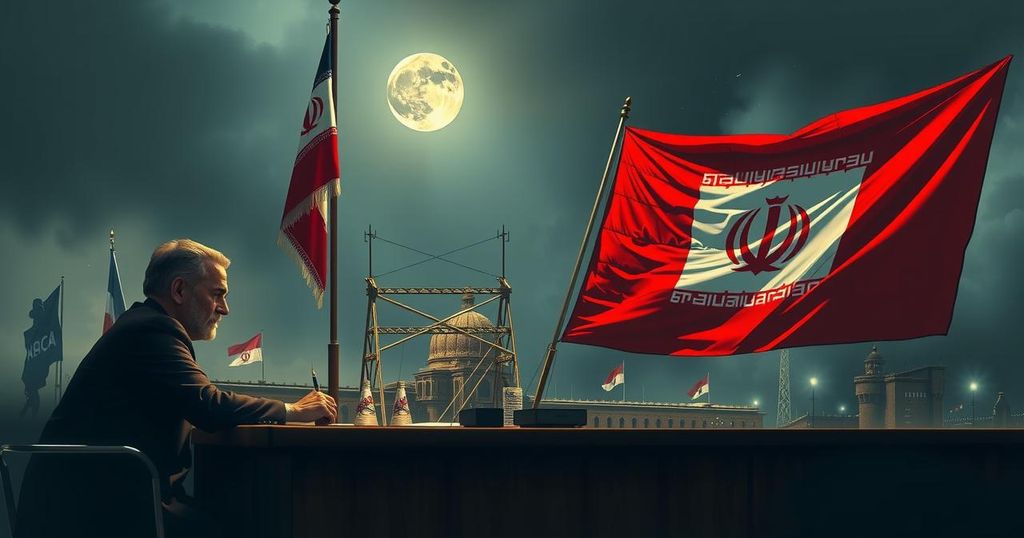Iran has endorsed Lebanon’s pursuit of a ceasefire with Israel amidst ongoing military strikes by Israel in southern Beirut. Diplomatic efforts, led by the U.S., are underway, proposed to the Lebanese parliament by the U.S. ambassador. Discussions involving Hezbollah and Iranian officials suggest a commitment to support Lebanon’s decisions regarding the conflict and UN resolutions. Current hostilities have led to significant humanitarian crises and considerable loss of life, emphasizing the urgent need for a ceasefire agreement.
Iran has publicly declared its support for Lebanon’s efforts in negotiating a ceasefire with Israel, according to a high-ranking Iranian official on Friday. This statement reflects Iran’s intent to mitigate the ongoing conflict, which has severely affected its ally, Hezbollah. Currently, Israel’s airstrikes on Hezbollah-controlled areas in southern Beirut have been ongoing for four days, causing widespread destruction and coinciding with diplomatic efforts led by the United States toward achieving a ceasefire. Reports from two senior Lebanese political sources, cited by Reuters, indicate that the U.S. ambassador to Lebanon had recently proposed a draft ceasefire to Nabih Berri, the speaker of Lebanon’s parliament, who is supported by Hezbollah. Following this proposal, Berri met with Iranian official Ali Larijani. During a press conference, when asked about any intentions to impede the U.S. ceasefire plan, Larijani stated, “We are not looking to sabotage anything. We are after a solution to the problems.” He emphasized Iran’s support for Lebanon, attributing disruptions in the process to Israeli Prime Minister Benjamin Netanyahu and his administration. Hezbollah, originally established by Iran’s Revolutionary Guards in 1982, remains heavily financed and armed by Tehran. In contrast, a senior diplomat expressed concern about the duration required to finalize a ceasefire, albeit remaining optimistic about the potential for success. Despite struggles in reaching a resolution in Gaza, the outgoing U.S. administration is keen on a swift ceasefire in Lebanon. International entities insist that the ceasefire in Lebanon must adhere to UN Security Council Resolution 1701, which concluded the 2006 war between Hezbollah and Israel. This resolution mandates that Hezbollah must relocate its arms and personnel north of the Litani River, approximately 20 kilometers from the border. Israel insists on the right to respond to any violations of this agreement, a stipulation that Lebanon has currently rejected. In discussions with Larijani, caretaker Prime Minister Najib Mikati reiterated the importance of supporting Lebanon’s adherence to Resolution 1701 while also advocating for an end to “Israeli aggression.” Larijani reiterated Iran’s commitment to supporting Lebanon’s decisions, particularly concerning Resolution 1701. Israel commenced its military operations against Hezbollah in late September, following a year of escalating cross-border conflicts intertwined with the Gaza situation. The Israeli government aims to ensure the return of tens of thousands of Israelis who had evacuations in response to Hezbollah attacks. The campaign has now displaced over one million Lebanese nationals, resulting in a significant humanitarian emergency. Reports from Israel’s health ministry indicate that since October 7, 2023, Israeli military actions have caused the deaths of at least 3,386 individuals, the majority occurring since late September. Hezbollah’s counteractions have reportedly led to around 100 casualties among civilians and soldiers in northern Israel, the Israeli-occupied Golan Heights, and southern Lebanon throughout the past year. Recently, Israeli Energy Minister Eli Cohen mentioned the increased prospects for a ceasefire being more favorable than at any time since hostilities began. Furthermore, reports indicate that Netanyahu seeks to expedite the ceasefire process to secure a notable foreign policy victory ahead of the incoming administration of President-elect Donald Trump.
The conflict between Israel and Hezbollah has deep historical roots and has seen numerous escalations. Currently, tensions have surged due to Israel’s military operations in response to cross-border hostilities. The humanitarian consequences of the conflict extend beyond the immediate violence, as large-scale displacements have created significant crises. Joint efforts by international powers prioritize a resolution aligned with previous UN mandates, emphasizing the necessity to prevent further escalation and safeguard civilian lives. Iran’s involvement illustrates the geopolitical complexities surrounding the conflict, particularly its support for Hezbollah, which is a critical ally in the region for Tehran.
The ongoing military conflict between Israel and Hezbollah necessitates immediate attention to ceasefire negotiations, as both sides face dire humanitarian repercussions. Iran’s commitment to support Lebanon’s government reflects its vested interests in the outcome of these discussions, while U.S. initiatives signal a collective international interest in restoring peace. The complexity of the situation emphasizes the necessity for diplomatic engagement to fulfill the terms of previous resolutions while addressing the immediate needs of affected populations. Achieving a ceasefire represents a pivotal step towards stability in the region.
Original Source: indianexpress.com






